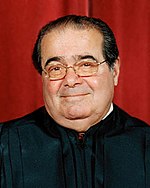| Type | Case | Citation | Issues | Joined by | Other opinions |
|---|
101
| United States v. Bormes • [ full text ] | 568 U.S. 6, 7–16 (2012)
| Fair Credit Reporting Act • Little Tucker Act • waiver of sovereign immunity | Unanimous | |
| Scalia's unanimous opinion for the Court held that the Little Tucker Act had no applicability to claims brought under the FCRA. The purpose of the Little Tucker Act was to provide judicial remedies for claims against the federal government that were authorized by statutes that did not provide a method for enforcement. As such, it is a gap-filling statute, and so the Court ruled that its provisions do not apply when another statute itself sets forth the conditions by which it is to be enforced, as the FCRA does. |
102
| Smith v. United States | 568 U.S. 106, 107–14 (2013)
| withdrawal from a conspiracy as affirmative defense • burden of proof • Due Process Clause | Unanimous | |
|
203
| Bailey v. United States | 568 U.S. 186, 203–06 (2013)
| Fourth Amendment • detention incident to the execution of a search warrant | Ginsburg, Kagan | |
|
404
| Henderson v. United States | 568 U.S. 266, 280–88 (2013)
| Federal Rules of Criminal Procedure • Rule 52(b) • plain error | Thomas, Alito | |
|
205
| Johnson v. Williams | 568 U.S. 289, 306–12 (2013)
| Antiterrorism and Effective Death Penalty Act of 1996 • habeas corpus • presumption of adjudication on the merits | | |
|
406
| Amgen Inc. v. Connecticut Retirement Plans and Trust Funds | 568 U.S. 455, 483–86 (2013)
| securities fraud • Securities Exchange Act of 1934 §10(b) • SEC Rule 10b-5 • fraud-on-the-market theory • materiality • class certification | | |
|
307
| Decker v. Northwest Environmental Defense Center | 568 U.S. 597, 616–26 (2013)
| Clean Water Act • Industrial Stormwater rule | | |
|
408
| Haynes v. Thaler • [ full text ] | 568 U.S. 970, 971–73 (2012)
| ineffective assistance of counsel • procedural default | Thomas, Alito | |
| Scalia dissented from the Court's granting of a stay of execution. |
109
| Florida v. Jardines | 569 U.S. 1, 3–12 (2013)
| Fourth Amendment • detection dogs • curtilage | Thomas, Ginsburg, Sotomayor, Kagan | |
|
110
| Comcast Corp. v. Behrend | 569 U.S. 27, 29–38 (2013)
| antitrust law • class action certification | Roberts, Kennedy, Thomas, Alito | |
|
411
| US Airways, Inc. v. McCutchen | 569 U.S. 88, 106–07 (2013)
| Employee Retirement Income Security Act • health plan reimbursement from recovery from third parties • unjust enrichment • double-recovery rule • common-fund doctrine | Roberts, Thomas, Alito | |
|
112
| Arlington v. FCC | 569 U.S. 290, 293–307 (2013)
| Telecommunications Act of 1996 • Chevron deference to agency interpretation of its own statutory jurisdiction | Thomas, Ginsburg, Sotomayor, Kagan | |
|
413
| McQuiggin v. Perkins | 569 U.S. 383, 401–12 (2013)
| Antiterrorism and Effective Death Penalty Act of 1996 • actual innocence • miscarriage of justice | Roberts, Thomas; Alito (in part) | |
|
414
| Trevino v. Thaler | 569 U.S. 413, 434 (2013)
| ineffective assistance of counsel • procedural default | Thomas | |
|
415
| Maryland v. King | 569 U.S. 435, 466–82 (2013)
| Fourth Amendment • DNA profiling of arrestees • warrantless search | Ginsburg, Sotomayor, Kagan | |
|
216
| Association for Molecular Pathology v. Myriad Genetics, Inc. | 569 U.S. 576, 596 (2013)
| patent law • gene patents • DNA extraction • BRCA mutation | | |
|
217
| United States v. Davila | 569 U.S. 597, 613 (2013)
| Federal Rules of Criminal Procedure Rule 11 • vacatur of guilty pleas • prejudicial error | Thomas | |
|
118
| Arizona v. Inter Tribal Council of Ariz., Inc. | 570 U.S. 1, 4–20 (2013)
| National Voter Registration Act of 1993 • Elections Clause • Arizona Proposition 200 (2004) | Roberts, Ginsburg, Breyer, Sotomayor, Kagan; Kennedy (in part) | |
|
419
| Agency for Int'l Development v. Alliance for Open Society Int'l, Inc. | 570 U.S. 205, 221–27 (2013)
| United States Leadership Against HIV/AIDS, Tuberculosis, and Malaria Act of 2003 • Spending Clause • conditions imposed on recipients of federal funding • First Amendment • free speech | Thomas | |
|
120
| American Express Co. v. Italian Colors Restaurant | 570 U.S. 228, 231–39 (2013)
| Federal Arbitration Act • Sherman Antitrust Act • class action | Roberts, Kennedy, Thomas, Alito | |
|
221
| Fisher v. University of Texas at Austin | 570 U.S. 297, 315 (2013)
| affirmative action • race as factor in college admissions • Fourteenth Amendment • Equal Protection Clause | | |
|
422
| United States v. Kebodeaux | 570 U.S. 387, 406 (2013)
| Sex Offender Registration and Notification Act • Necessary and Proper Clause | | |
|
423
| Adoptive Couple v. Baby Girl | 570 U.S. 637, 667–68 (2013)
| Indian Child Welfare Act • termination of parental rights | | |
|
124
| Sekhar v. United States | 570 U.S. 729, 730–38 (2013)
| Hobbs Act • definition of extortion | Roberts, Thomas, Ginsburg, Breyer, Kagan | |
|
425
| United States v. Windsor | 570 U.S. 744, 778–802 (2013)
| Fifth Amendment • equal protection • Defense of Marriage Act • same-sex marriage | Thomas; Roberts (in part) | |
|
426
| Brown v. Plata | 570 U.S. 938, 938–40 (2013)
| Prison Litigation Reform Act • prison overcrowding | Thomas | |
| Scalia dissented from the Court's denial of an application for a stay. |



